Amps That Don’t Exist - Part One: 1959 Brown Fender Super Amp
Amps That Don’t Exist - Part One: 1959 Brown Fender Super Amp
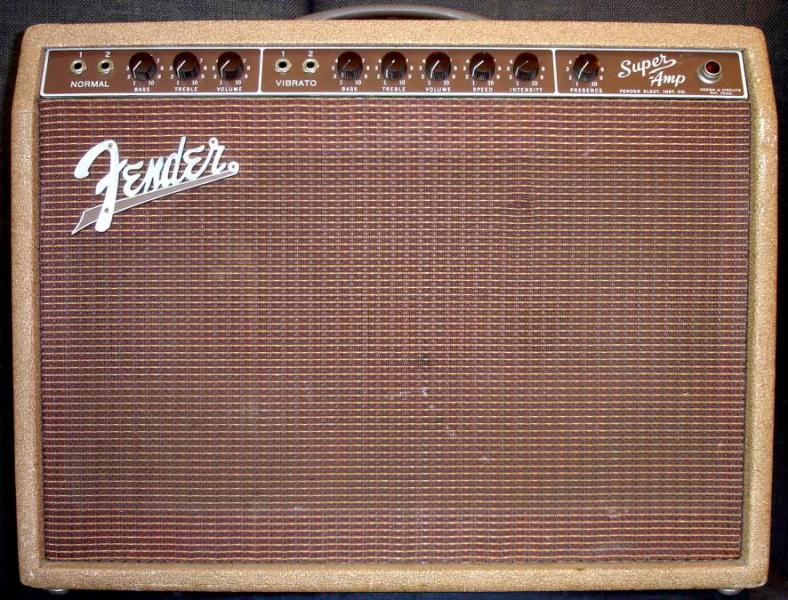 Amps that don’t exist, you ask? Yea,
sorta. I’m starting out this little series
with my 1959 Brown Fender Super
Amp, which was featured in the October issue of Vintage Guitar Magazine, and will be
featured in Dave Hunter’supcoming vintage amp book. Fender didn’t
officially release any of the "Browns" until 1960, but this one bears a 1959
tube chart circuit designation, and all 1959 dated components ... so, officially,
it doesn’t exist. Interested, then read
on!
Amps that don’t exist, you ask? Yea,
sorta. I’m starting out this little series
with my 1959 Brown Fender Super
Amp, which was featured in the October issue of Vintage Guitar Magazine, and will be
featured in Dave Hunter’supcoming vintage amp book. Fender didn’t
officially release any of the "Browns" until 1960, but this one bears a 1959
tube chart circuit designation, and all 1959 dated components ... so, officially,
it doesn’t exist. Interested, then read
on!
With its 5G4 circuit designation, this particular amp, with a serial number of 00031 has one foot still in tweed land and one foot in the brown era. It is one of the very rare models that sports the "backward" control panel layout, which reads from left to right BASS-TREBLE-VOLUME. These were the very first amps Fender made that had the control panel facing forward, and it seems as though they forgot about that when they made the first few prototypes. Crazy, huh? By the time the amps were officially releases, they had corrected that and the controls were VOLUME-TREBLE-BASS, as one would expect.
This "phantom" amp also sports a peculiar "Pulse Adj." hole in the back panel, which came from the factory with a plug in the hole. It seems as though Leo had some idea in mind that never materialized once the brown Supers were actually out. Theories abound as to what that mysterious pulse-adjust was going to be, but the truth is, nobody really knows! Leo took that info with him to the grave.
Like the tweed Super before it, the brown Super Amp is a 2-10 combo. The Brown version has a pair of 6L6’s putting out about 40 watts. Its tube rectified, of course and sports five 12AX7/7025’s, the tremolo circuit actually uses two of these tubes (four triode stages) ... wow. The tremolo of the early browns is legendary. This amp also employs the long-tail phase inverter that was only also used in the tweed high-power Twin, Tremolux, and the famous tweed Bassman. This, most early of all brown Super’s sports a pair of blue-bell alnico Jensen P10Q’s, I love all the WGS stuff, but I gotta tell you, those old American made bluebells are some seriously sweet speakers!
How does this phantom amp sound? Well, given that it is 100% stock ... with all the original 1959 components, it sounds really darn great. It breaks up just as a good vintage Fender should and is both very warm and also sweet and chimey, all at the same time.
For the entire story, pick up a copy of the October issue of Vintage Guitar (available online), or look for Dave Hunter’s book to hit the shelves. For now, here are some pics from the Vintage Guitar photo shoot. BTW, next week, I really will be featuring an amp that doesn’t exist. Intrigued?
Until next time, -Vaughn-

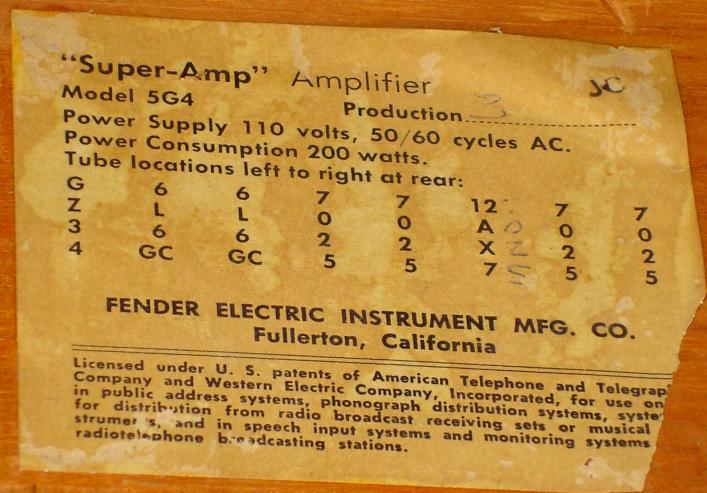
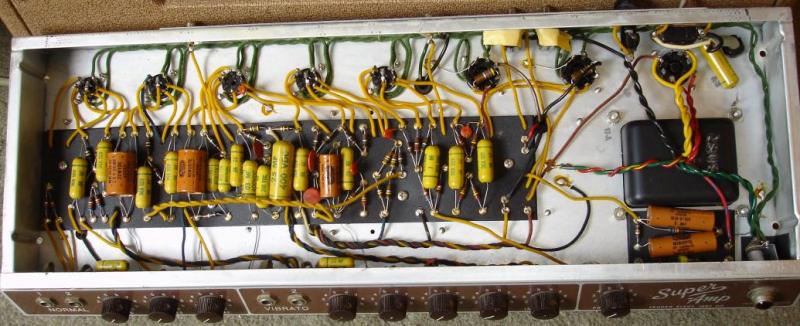
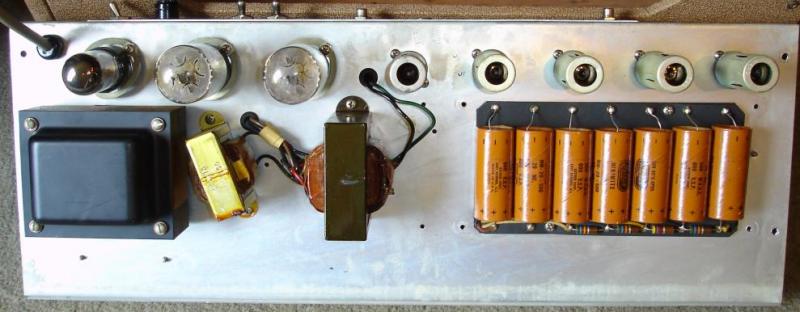
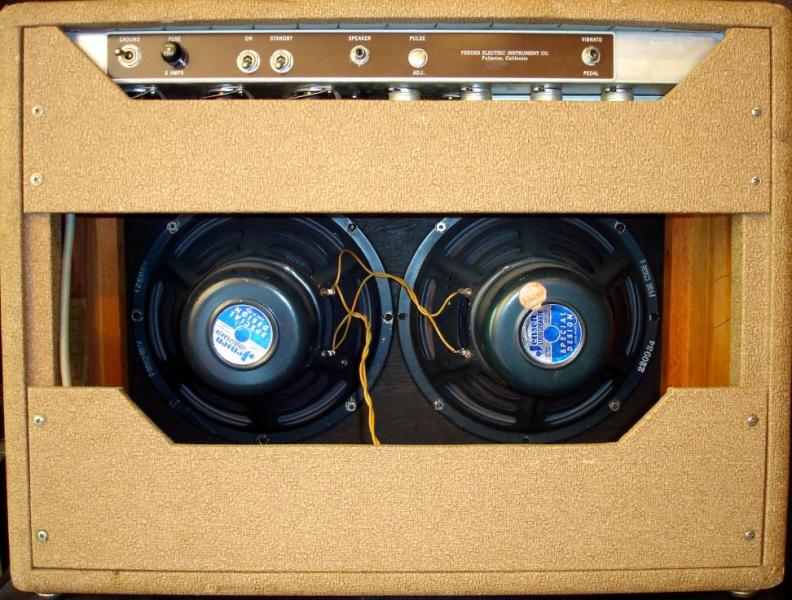
- VAUGHN SKOW's blog
- Log in or register to post comments


wow what a lucky fella to own such a rarity. very nice piece of fender history right here.
Vaughn, Was there ever a schematic or layout done of your 5G4 Super? I'd like to build one as a gift for my Dad, and I can build pretty much anything with a proper layout and a couple photos... Thanks in advance! ~Eric~
Hi Eric, As far as I, and expert Dave Hunter can tell, no, there never was. It’s mostly a 6G4 Super, but retains some aspects of the tweed super! As far as we can tell, it was most likely a pre-production model that was rushed out as a demo or as a gift to some artist that they were courting. What’s really amazing is that it still sounds great after all these years, running on all the original parts. What a testament to Leo’s design and build quality!
Vaughn Skow, Tone Guru, WGS
The Fender Field Guide has a 5G4 schematic. It even has the backwards faceplate.
It has the 6G4 ... not 5G4!
I think I have one of these amps as well. It is a. 5G4 "CENTER VOLUME" serial number 00724. More info on this particular model has been tough to find. Id like to know exactly what I have and how ra
re it is. Can anyone help me out a little more?
See:
http://wgs4.com/amped-illustrated-history-worlds-greatest-amplifiers
You might want to get this book.
Your S/N would indicate it's the 724th brown made ... generally the "prototype" features of the officially never-produced 5G4 were gone by S/N 50 ... so yours is quite a curiosity for sure!!! Totally a head-scratcher for me...
Just found your website and amp info. The tube chart from your amp is March 1960 "JC" and production #3. Your amp was made spring of 1960 (not 1959, Fender sourced parts months in advance) and is indeed a 5G4 circuit. But it wasn't made in 1959, the circuit design is designated originating in the 50's but the tube chart indicates Mar 1960 production.
I own a 1960 5G4 Super Amp, "JA" on the tube chart for January 1960 & Production #1. All late 59 parts, pots, Jensen speakers, trannys. Mine is Serial #13.
The circuit layout of your amp is identical to mine as far as I can tell from the pictures. Hopefully you've done a complete cap job on your amp to keep from damaging any of the circuit when the filter caps go.
These amps are not prototypes, they were regular production run. The next version still had 5 preamp tubes and the normal Vol, Treble, Bass control layout and the next revision Brownface Super Amp had 6 pre-amp tubes and a different circuit layout.
Take Care,
Ken